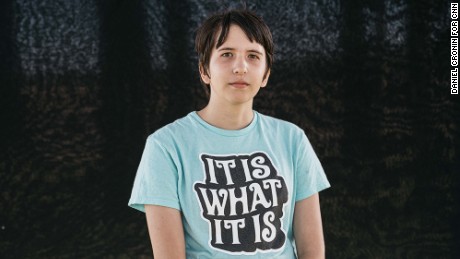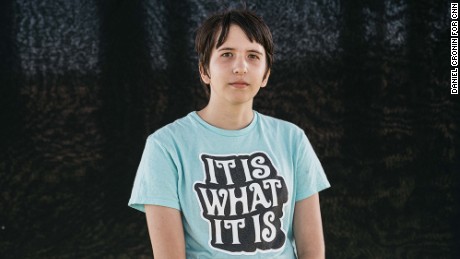Saving the planet for future generations

Eugene, Oregon (CNN)Jayden Foytlin, a shy 13-year-old from Rayne, Louisiana — who loves K-Pop and science class — sat in front of a federal judge here Tuesday. She wore a choker necklace and Weezer glasses.
She wasn’t here to observe.
Foytlin is one of 21 young plaintiffs suing President Obama and various federal agencies over what she calls the United States’ failure to protect her right to a future not wrecked by climate change.
It’s a lawsuit that has been called the “biggest case on the planet” — one that makes a constitutional argument that young people and unborn generations are being discriminated against because they don’t have the right to vote but will be most affected by runaway warming.
The kids also are making the claim that their rights to life, liberty and property are being infringed upon by the stronger storms, scarier droughts and rising seas that come with warming.
It’s a case that some would call a long shot but that I see as a heroic attempt to force the government to do what the science calls for: nearly eliminating fossil fuels this century.
President Obama deserves credit for tackling climate change as no other US president has.
But scientists will tell you that isn’t enough — not even close.
At the Tuesday hearing, Judge Ann Aiken listened to oral arguments from Julia Olson, the kids’ attorney, as well as those from lawyers for the US Department of Justice and the fossil fuel industry — who, tellingly and somewhat tragically, argued in virtual lockstep on this issue.
Aiken likely will decide within 60 days whether the case can go to trial.
Olson took the microphone to address the judge.
“I want to begin with Jayden’s story.”
In the front row, flanked by her peers, Foytlin squirmed at the mention of her name. The wounds are still fresh — her own story hard for her to hear.
Olson took the court back to August, when deadly floodwaters covered Louisiana — floods that, since then, have been linked by government scientists directly to climate change.
“She woke up at 5 a.m. on the morning of August 13 and she was ankle deep in water in her bedroom,” Olson said of Foytlin, who sat in the front row with pen and notepad in hand.
“As she says, she ‘stepped right out of the bed and right into climate change.'”
Despite living outside the floodplain, according to her mother, Cherri Foytlin, their house flooded during the outsize rainstorms, which are expected to become more intense as we continue to burn fossil fuels and heat up the atmosphere. Raw sewage ran like a river through the home, mother and daughter told me in an interview. Jayden Foytlin still sleeps in the living room.
The damages amount to tens of thousands, her mother said, and the family doesn’t have flood insurance because their town had never flooded.
“I don’t want to see another family go through what we are experiencing,” the younger Foytlin told reporters after the hearing, glasses slipping down her nose. “Thirteen people died in the flood. … Nobody should have to bury their loved ones simply because the government wants to bury their heads from the truth or because oil companies want to bury themselves in money.”
The crux of the climate-kids case is about constitutional rights and legal damages, of course. It’s about what the government knew and when — and whether it was acting with deliberate indifference to the consequences of boosting a system that relies on dirty energy.
But it’s also about heart and morals.
What do we owe to the kids? And to generations yet to be born?
Quin Sorenson, representing industry and fossil fuel interests, told Aiken this case lacks standing in part because you can’t connect specific pollution to specific harms.
Further, he questioned whether the government had created climate change or simply allowed it to happen. “That is not creation of the danger, that’s allowance of the danger,” he said.
Climate change is real and we’re causing it, admitted Sean Duffy, a US Department of Justice attorney. But federal courts, he said, are not the forum to hash out solutions.
Congress and the President are tasked with that, he said.
Aiken seemed to bristle at these arguments.
“The plaintiffs have made a wonderful case that should be heard in the halls of Congress,” Duffy said, implying that it’s not the court’s job to drive federal climate policy.
“It has been heard in the halls of Congress,” Aiken quipped.
What I hope Aiken realizes is how much climate change weighs on these kids — how much their lives will be shaped by the decisions of adults.
Over the weekend, I got the chance to talk with most of the youth plaintiffs. It was clear that climate change takes a psychological as well as a literal toll.
“I can’t even go to the beach,” said Levi Draheim, a curly-haired 9-year-old from a barrier island in Florida, which he worries, quite reasonably, will be flooded as seas rise. “It gives me nightmares. Sometimes I catch myself waking up and I (am) just screaming.”
Aji Piper, 16, of Seattle, told me climate change is “all consuming” in his thoughts. “It’s hard to think about anything else when you have this massive, overarching problem.”
I asked Piper how he would rank climate change as a stressor: Was it above or below school, relationships, family and friendships?
“I think climate change is top,” he told me.
“You feel like there’s no point in fighting, but you have this knowledge” that climate change is real, he said. “So you still fight against this, because it’s the only thing you can do.”
They can’t vote. But they hold out hope that the courts may listen.
“If I didn’t (have hope) I’d be playing ‘League of Legends’ on my computer right now,” Nick Venner, 15, from Colorado, told me the day before the hearing. “Of course there’s hope.”
Jayden Foytlin doesn’t plan to give up, either.
Her mother told me how her daughter, at 5, entered a sheep-riding contest with mostly older contestants. Two of her older siblings fell of the sheep right away.
“This sheep dragged her all over. It stepped on her. She didn’t let go,” Cherri Foytlin told me.
Let’s hope the courts show the same tenacity.
After recounting Foytlin’s story and presenting shocking evidence of how long the government has been avoiding substantive action on climate change — since the 1950s — Olson closed her argument with a quote from the writer Terry Tempest Williams:
“The eyes of the future are looking back at us and they are praying for us to see beyond our own time.”
On Tuesday, those eyes gazed back from the front row of a federal courtroom.
Read more: http://www.cnn.com/2016/09/13/opinions/climate-kids-federal-lawsuit/index.html
